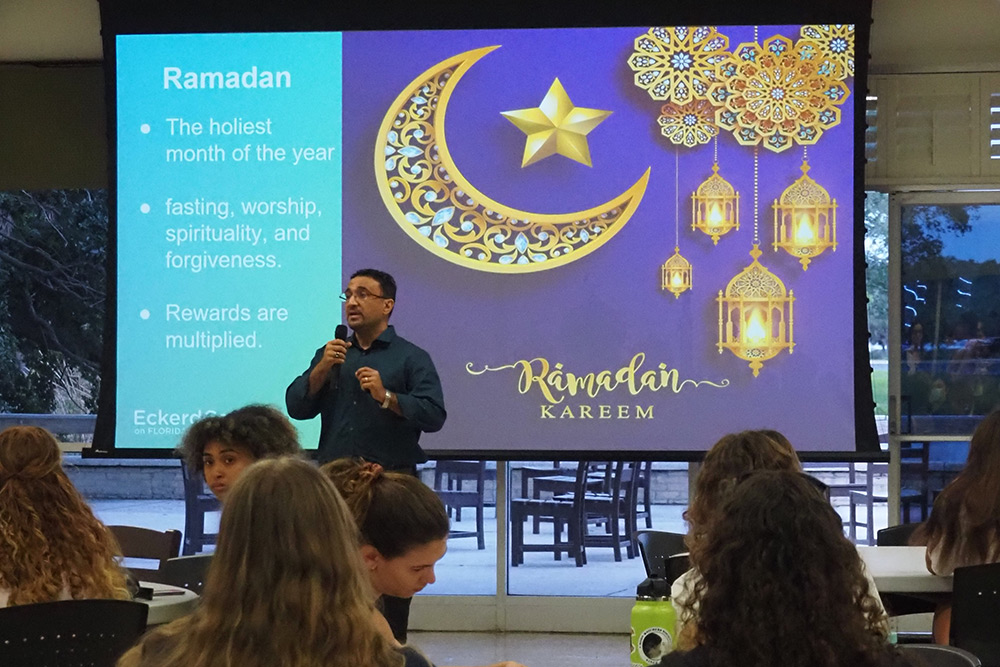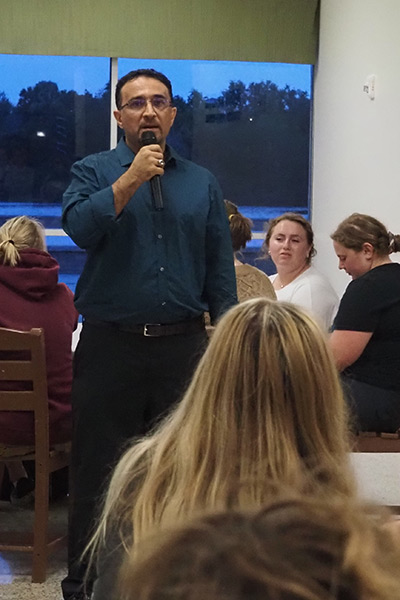
Arabic Instructor Qays Majeed speaks during a traditional Iftar in Fox Hall; photos by Ashlyn Fransen ’24
They shared fist bumps and a delicious meal of salad, rice, several protein options, pita with yogurt, and baklava for dessert when more than 100 Eckerd College students, faculty and staff joined Arabic Instructor Qays Majeed and the Arabic Club for a traditional Iftar in Fox Hall on March 29 to learn more about the holy practice.
Iftar is the fast-breaking meal that is eaten after sunset each night during Ramadan. For Muslims, Ramadan is the holiest month of the year—they fast every day for 30 days, from sunrise to sunset. Majeed began the celebration with a brief presentation. He explained what Ramadan is and what it means to fast—saying that Iftar is a social event meant to foster relationships during the Month of Forgiveness.
When the presentation concluded, he opened the conversation to questions. The engaged students asked Majeed if he practices Ramadan (he does), how often people pray during Ramadan (as often as they want), and whether university schedules are modified to accommodate students who observe the holy holiday (it depends on the region and the institution).
Eckerd’s Arabic Club provided a catered Middle Eastern meal for all students, faculty and staff in attendance. Typically, Muslims begin Iftar by eating white dates or soup. Consuming heavy foods too soon after a fast can have adverse effects on the body, but these foods are a gentle place to start.
The Arabic Club also provided a table with name tags where members wrote students’ names in Arabic.
First-year creative writing student Jordan Keldani, from Chicago, Illinois, says he chose to take Arabic because his family on his dad’s side is Arabic. “I never learned to read or speak it,” he adds, “so when I came to Eckerd and it was an option, I chose Arabic because of the connection to my family.”
Jordan says he picked up on the alphabet fairly quickly and finds all the grammar rules relatively easy. He enjoys connecting with other students who are learning Arabic.
Majeed came to the United States from Iraq when he was 29. Before coming to Eckerd, he taught at a college in Pennsylvania. He got tired of the cold climate and snow, so he applied for the job at Eckerd. He found it to be a welcoming community and, of course, he enjoys Florida’s sunny weather much more. Majeed says these types of events are never about “promoting” his religion. The goal is simply to educate. Sharing knowledge and mutual understanding is the driving force of his teaching philosophy.
Teaching the language is a wonderful experience, Majeed says, and he also enjoys sharing these elements of culture with his students—many of whom came out to celebrate Iftar.













